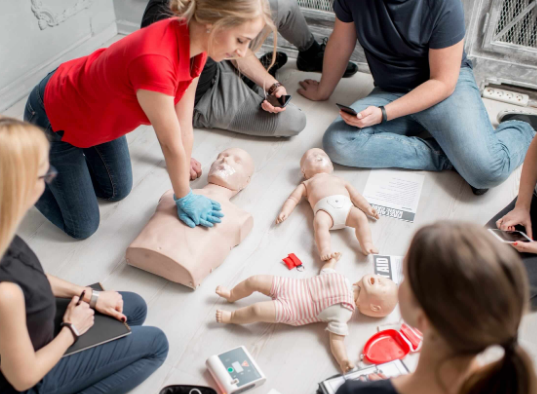
What’s the Scope of the CPR Certification Course in 2025?
If there’s one skill that’s gaining serious importance lately, it’s CPR. It’s no longer just for doctors or nurses anymore. In 2025, people from all kinds of jobs are getting certified. Teachers, gym trainers, office workers, and even parents are learning how to stay calm and help in an emergency.
As safety awareness grows across workplaces and communities, the CPR certification course in Houston has turned into a skill that’s both empowering and practical, one that lets you step up and help when every second counts.
Why is the CPR Certification Course in Houston in High Demand Right Now?
Think about how much the world has changed in the last few years with remote work, increased awareness about health emergencies, and a growing focus on personal safety. Every organization now wants at least a few people on-site who can respond in an emergency before medical help arrives. That’s where CPR training comes in the picture.
The demand is growing at a quick rate in:
- Workplaces: Many companies are making CPR training part of their employee wellness or safety programs.
- Schools and universities: Teachers, coaches, and administrative staff are encouraged to get certified.
- Fitness centers: Trainers and instructors often need CPR certification to maintain their licenses.
- Public sectors: Security guards, police officers, and flight attendants are required to be CPR certified.
A Skill That Opens Doors
Today, getting your CPR certification course from reputable places like CPR Training Clinic can do a lot more than just prepare you for emergencies. In 2025, more employers are paying attention to this qualification than ever before. Hospitals, schools, gyms, and even big companies see CPR-trained staff as reliable and responsible people who can handle pressure when it counts.
When you add “CPR Certified” to your resume, it tells employers you care about safety, you’re dependable, and you don’t freeze up when something serious happens. It’s a small line on paper, but it speaks volumes about your mindset.
These are some of the fields where this certification gives you an edge:
- Healthcare & Nursing: For nurses, caregivers, and EMTs, this isn’t optional, but a must. It keeps you job-ready and confident in high-stress moments.
- Childcare: Parents trust you more when they know you’re trained to act fast in an emergency. Many daycare centers now require it for licensing.
- Sports & Fitness: Trainers, gym owners, and coaches gain instant credibility when certified.
- Hospitality & Tourism: Hotels, resorts, and airlines love hiring people who can stay calm under pressure, especially when guests’ safety is involved.
How Does the Course Look in 2025?
Gone are the days when CPR training meant sitting in a classroom for hours, watching long demonstrations, and practicing on a mannequin in a crowded hall. Now, CPR certification course has become way more flexible, modern, and surprisingly convenient.
The best part? You get to choose how you want to learn! A lot of organizations now offer three options, so you can go at your own pace without feeling rushed or tied to a fixed schedule.
Here’s how CPR certification course in Houston is set up these days:
- Online learning: You’ll go through short, easy-to-follow video lessons and virtual simulations that show real-life situations. The platforms are interactive, which means you’ll answer quick quizzes, make scenario-based decisions, and actually see how your choices play out.
- Hands-on practice: While most of the theory is online, there’s still a short in-person session. This is where you practice chest compressions, rescue breaths, and AED use with guidance from a certified instructor.
- Instant certification: No waiting around for results. Once you’ve completed your test and hands-on session, you get your digital CPR certificate right away, often within minutes!
What Do You Actually Learn?
A lot of people think CPR training is just about chest compressions, but it’s much more practical and detailed. The course covers a mix of real-life skills and quick-decision training.
You’ll learn things like:
- Recognizing cardiac arrest: How to identify early signs before it’s too late.
- Proper CPR technique: The right compression depth, rhythm, and hand placement.
- AED use: How to safely use an automated external defibrillator (the one you see at airports and malls).
- Assisting choking victims: Step-by-step actions for both adults and children.
- Basic first aid: Many courses also include wound care, bleeding control, and recovery positions.
Renewal and Staying Updated
One thing people often forget is that CPR certification isn’t forever. Typically, it’s valid for two years, after which you’ll need a refresher course. Why? Because techniques change. The American Heart Association and Red Cross regularly update CPR guidelines as new research emerges. Renewing your certification keeps your skills up to date and makes sure you’re following the latest standards. Luckily, renewals are quick. Most take about half the time of your initial course.
Your Sign to Finally Learn CPR This Year
If you’ve been waiting for the perfect time to get certified, this is it. 2025 is all about being ready, confident, and capable in jobs, in communities, and in daily life. CPR certification course in Houston isn’t merely a class you take and forget; it’s a life skill that stays with you, giving you the confidence to act when others hesitate.
You don’t need to be a doctor to save a life. You just need a few hours, a willingness to learn, and a certification that shows you’re ready when it counts.
So take this as your sign to finally do it. Head over to the CPR Training Clinic and book your class today!




